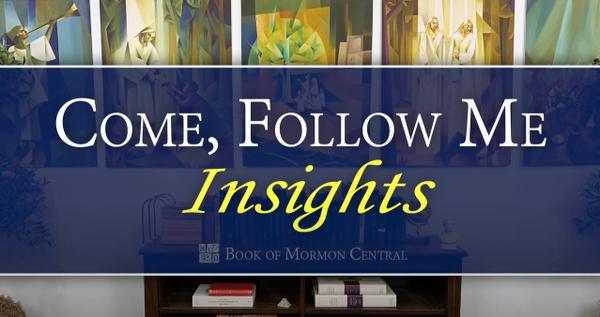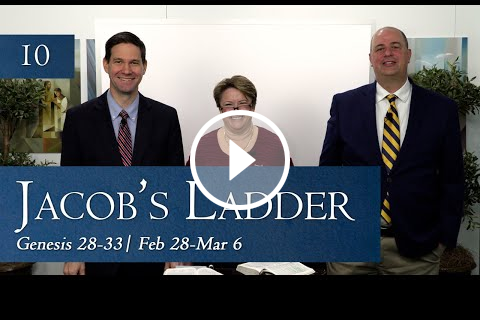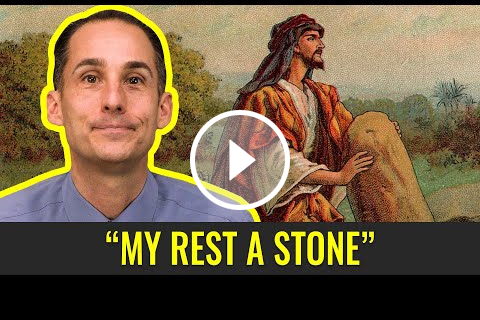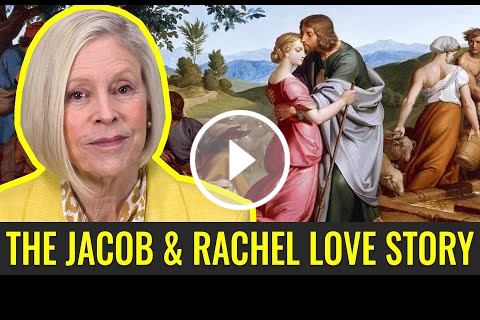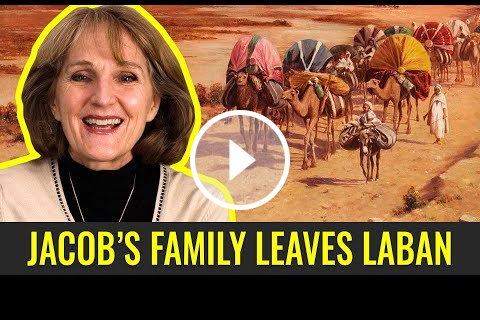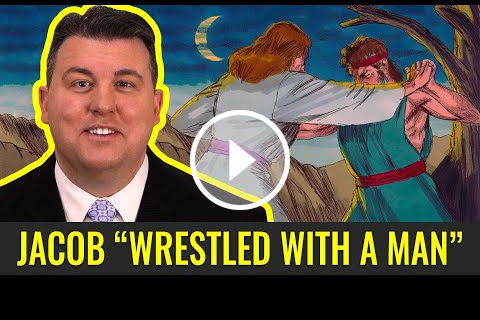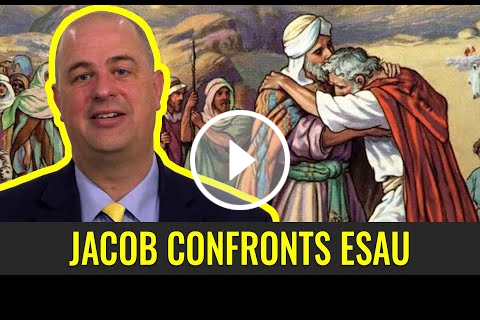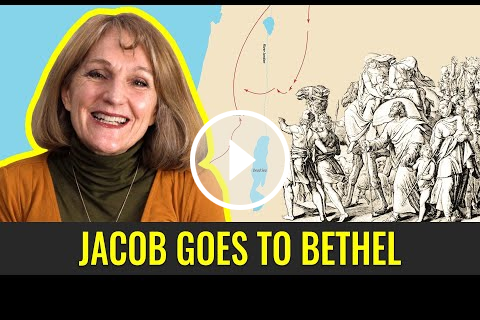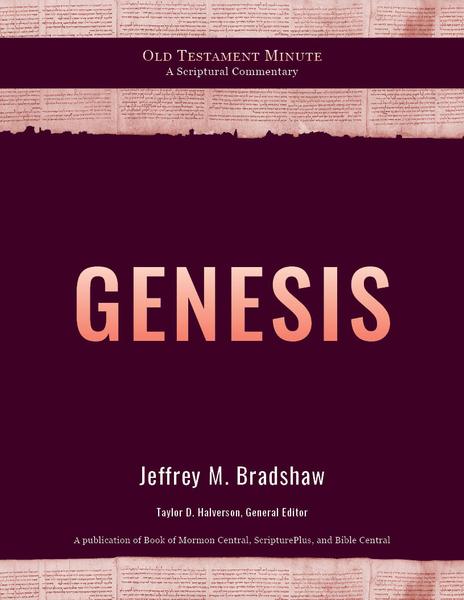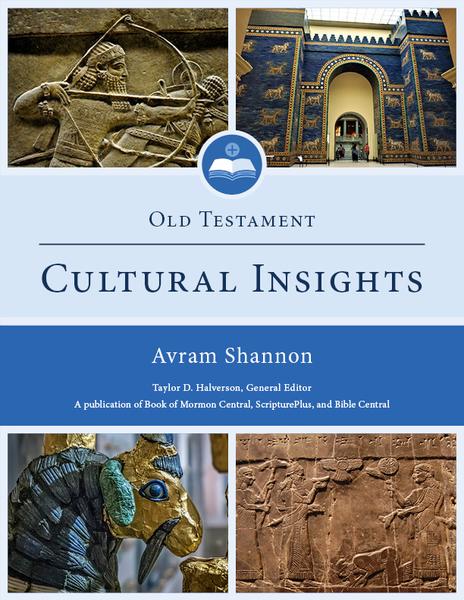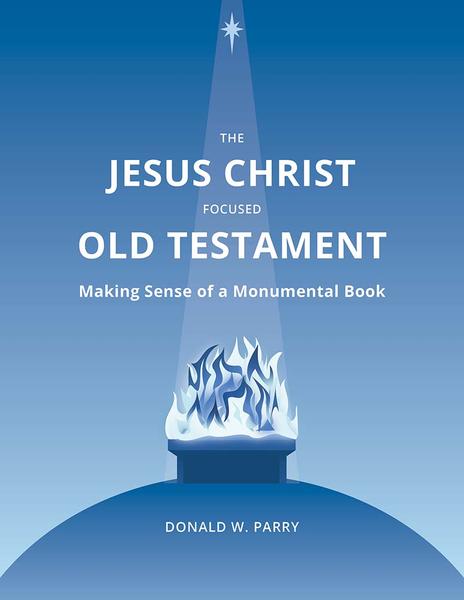Feb 28-Mar 6 (Genesis 28-33) Come Follow Me Insights with Taylor and Tyler – powered by Happy Scribe
I’m Taylor.
And I’m Tyler.
And I’m Gay Strathearn.
This is the Book of Mormon Central’s Come Follow Me Insights.
Today, Genesis Chapters 28-33.
And we’re with our friend and colleague in ancient scripture expert Gay Strathearn.
Tell us a bit about about yourself.
Well, I come from the land down under, and I’ve been here for quite a number of years now, going to school. And one of the things that I love most is thinking about and studying the Bible. So I’m really happy to be here.
And she’s got some great insights, some really useful insights for us today about God’s covenants and Jacob coming to learn about God’s covenant for him.
And as we jump into today’s lesson, I think it would be really helpful for you to get a little bit of perspective from Gay on how this block of chapters we’re going to cover today actually has a huge impact on us today. But first, if you look at what we’re going to cover, chapter 28 to 33 to set the stage. Gay, what would you tell them from your perspective from last week’s lesson where that whole experience with Isaac being blind and old and wanting to give the birthright to ESA and then Rebecca and Jacob kind of supplanting that blessing? What insights there?
Well, one of the things that I love about Jacob is he’s a multi dimensional figure. He’s not two dimensional at all. And we see a lot of kind of experiences with him. We see him having clearly a desire for spiritual things like his grandfather Abraham and seeking after the birthright, both with Esau and then with his dad. But his horizontal relationships are just kind of interesting, aren’t they? He just struggles with Esau. He has this issue with his dad and deceiving him. One of the Hebrew interpretations of his name, Jacob, is he that deceives. And I think that’s kind of we are often translated as the plant, but it’s he deceives and that kind of comes through and plays a way that’s going through. So with Jacob, we see this kind of this spiritual metamorphosis, this spiritual journey that he is on, where he’s learning about the Covenant and coming to a point where this becomes an important part of who he is and he wants it. It’s not an automatic just because God made a Covenant with his grandfather or with his father, Jacob has to decide that this is going to be his Covenant as well.
A number of years ago when I was a student at BYU, there was a forum by a guy by the name of Abraham Kaplan, and he was a Jewish philosopher. And he came and he said something that has changed the way that I have read this story of Jacob. He said, so why is it that we have this repetition, the God of Abraham, the God of Isaac and the God of Jacob, and he quotes one of the sages and he says this repetition is important because what it’s saying is it wasn’t enough for Isaac that his father, Abraham had made a Covenant. Isaac had to make it with God himself. And likewise in this story here with Jacob, it isn’t enough for him that his father and grandfather had made this Covenant. He has to choose it for himself as well. And so as we’re going through these stories, I think it’s important to look for the language of the Abrahamic Covenant and the blessings that God had for Abraham as he’s going through his experiences throughout his journey.
This is extremely helpful because I think honestly, if Jacob were standing here today addressing us, telling us his own story, I don’t think he would say this is relevant to me and my father and grandfather. And isn’t that wonderful? I think he would say, we’re showing you a pattern of what you need to do today. It’s not enough to be born into the best possible scenario, the best Covenant keeping family ever. If you yourself don’t make that covenantal connection with God, you’re missing out.
Absolutely. So let’s start here in chapter 28, you’ll recall that at the end of chapter 27, after we’ve had this experience of Jacob with his father and receiving the blessing from his father, Esau is really quite upset about that. And Rebecca understands what’s going on and says, you know, Jacob, it’s probably time for you to get out of Dodge and give Issa a little bit of time to cool off. And so then in chapter 28, we have Isaac is now giving his son his parting advice as he sends him off on this journey. There are two things that need to happen in this journey. Number one, he is to find a wife with Rebecca’s family. And number two is to give ESO time to cool off. But I love verses three and four, and this is again, notice the Abrahamic language here. And God Almighty bless thee for the patriarchs. That’s the name of God God Almighty. We don’t get the God of Abraham, Isaac and Jacob until Exodus, but here it’s God Almighty, El, Shaddai, and God Almighty bless thee and make thee fruitful and multiply thee, that thou mayest be a multitude of this people and give thee the blessing of Abraham to thee and to thy seed with thee, that thou mayest inherit the land wherein thou art a stranger which God gave unto Abraham.
So we’ve got those blessings, those Abrahamic blessings. God would be with Abraham. And now Isaac is hoping that he will continue to be with Jacob. He has the promised blessings of posterity and a great nation, and we have the promise of land.
Can I just point out here that it seems a little bit perhaps ironic that Abraham was originally given that blessing. Look at the stars in the heavens, look at the Sands on the seashore. That’s going to be like your posterity. And yet his son through which that promise is going to be fulfilled is only one. It’s this one boy. And then Isaac gets that same blessing restored to him, given to him, and he ends up with two sons. And if I were in their position, I would be thinking, well, if I’m going to have this huge prosperity, that means I’m going to have like 20 kids to get this started. And yet God did it with one. And I think sometimes you and I, as human beings, as mortals, we put perhaps the word is unreasonable expectations on the Lord to say, well, you promised this, or I expect this when I think he has ways throughout our especially in the Old Testament of reminding us that God’s thoughts and ways are not our thoughts and ways. Isaiah 55 is very clear that he is able to do his own work, and it’s not always going to come about with the math that we would prefer it to be brought about with.
He’s going to do it his way and in his time. Yes.
Because his time is very different to us.
Yes. Anyway, and so I love the fact that here Isaac, he’s old, he’s blind. He knows he’s going to die very soon, and he’s telling his son Jacob that God is going to make him fruitful and multiply him to be a multitude of people. I love that. And it is going to now expand greatly with these twelve sons coming up and daughter and a daughter, Diana. So now as we review really quickly back in verse three and four, Gay, it looks like there are kind of two aspects to this Covenant. What would you say about that?
Yeah. Well, the birthright that Jacob was trying to get from Esaur and from Isaac had two aspects to it. It was usually given to the firstborn son, which would be Esaur, and that’s that expectation. But Jacob, like Abraham, has this kind of yearning and seeking for the things of his fathers. And we see that with Esau and wanting the birthright, I think the two parts to understand is that that birthright had a physical or a temporary inherited temporal is the right word aspect of it. The birthright son was to get a double inheritance. And that was one of the reasons for that, is because they were supposed to look after the family and the clan and things like that. But there was also a spiritual aspect where the birthright son became kind of a representative for God. And that element is important. And I think it’s clear as we go through this that what Esau was really interested in was the temporal aspect of that. And Jacob had more of a sense of this spiritual aspect of it. And although he’s kind of still working out what that means and the implications for him, he did have that desire for that aspect, not just the wealth.
Yeah. So as a quick review from last week and the week before, you have them down here in Bears in Bersheva. And Isaac is sending Jacob North, wherever that region is, with Rebecca, Isaac’s wife, Jacob’s mother, where she had come from, remember, Laban is her brother. And so Isaac is sending him away. And in that interim time, Esau cools down a little bit and realizes, oh, I’ve married two Hittite women. Canaanite women from this region, which made mom and dad pretty upset. I wonder if I should marry inside of the family. So what does he do?
He takes a daughter from Ishmails.
Yeah. He goes and finds a daughter of Ishmael and marries her in these next few verses to try to gain some of that favor back for mom and dad at that time.
Okay. So as Jacob then embarks on this journey, he comes to a place called Lootz. His journey is kind of bookended by these two really, really significant spiritual experiences that he has. The first one is here at Lutz, and then the next one is going to be at the end of his journey at the Jabbak River. And we’ll talk about those ones. Okay. So we read in Genesis 28 where Jacob is in Loot, and he says, verse eleven, and he lighted upon a certain place and carried there all night because the sun was set and he took stones of that place and put them for his pillows and lay down in that place to sleep. And he dreamed and beheld a ladder set up on Earth, and the top of it reached to heaven. And behold, the Angels of God ascending and descending. And behold, the Lord stood above it, or it could be and beside him and said, I am the Lord God of Abraham, thy father and the God of Isaac. The land wherein thou liest to thee will I give it and to thy seed again, notice the Abrahamic Covenant language here, and thy seed shall be as the dust of the Earth, and thou shalt spread abroad to the west and to the east and to the north and to the south, and in thee and in thy siege shall all of the families of the Earth be blessed.
And behold, I am with thee and will keep thee in all places Whither thou goest and will bring thee again to this land. For I will not leave thee until I have done that which I have spoken of thee. Now something’s happening here, and it’s pretty amazing. The Prophet Joseph talks about the mysteries of Godliness happening here. We also have President Mormon, G Romney, and he talks about this experience as being a temple experience. And that really kind of fits in because what we see in temples is this ladder. It means this scent of greater levels of Holiness until we enter into the presence of God. And so there may well be a temple element of this. But what seems to be happening is that this is where God is officially inviting Jacob to be a part of this Covenant that his grandfather had made with him. Right. And so notice the elements that we’ve got. We’ve got posterity, we’ve got land, we’ve got this promise that God will be with him and look after him. Now, it’s clear, I think, that Jacob understood this as a kind of a temple experience because he changes the name from Lutz to Bethel, which in Hebrew means the house of God.
So just to Orient on the map, you’ve got Jerusalem. That’s right here. And then just north of Jerusalem, not far is this place, Bethel. And some of you will recognize Beth, meaning house of. So you get a few other Beths, like Bethany, Bethlehem, house of and El is God. It’s a temple text for him. It’s the house of God. He says, this is sacred space.
Yes. Yeah. And so I think it’s really interesting that Jacob, we need to remember, Jacob is at the beginning of not just his physical journey, but his spiritual journey. And so as God invites Jacob to be a part of this Covenant, I think there’s some evidence that he’s thinking, okay, but I think that he has some questions, and I love those down in verse, look at verses 20 through 22, and Jacob vowed Avowed, saying, If God will be with me and will keep me this way, I go and will give me bread to eat and Raymond to put on so that I come again to my father’s house in peace, then shall the Lord be my God. And this stone, which I have set up for a pillar, shall be God’s house Bethel. And of all that thou shalt give me, I will surely give the 10th unto thee. So that verse 22 has this sense of, okay, I’m willing to make this vow, and you’re promising some things, and I’m promising some things in return. But what I find interesting is verses 21 and 22, we have this if then statement. When these come up in scriptures, I’m always looking for these.
And so what I think Jacob here is saying, okay, God, you’re promising me this, but can I trust you? Right. So you’ve promised me some things. If you will be with me and will keep me in this way, will look after me in this journey and will give me bread to eat and raiment to put on so that I come again to my father’s house, then shall I choose thee to be my God. I think that that’s really important. And maybe we could put this on the board title. Would you do those? What are these kind of these conditions, these things that Jacob is looking for to be able to get his own personal experience and trust in God and God’s faithfulness. So, number one, if you will be with me, and the ways of being with me are to keep me in the way that I go look after me in this journey.
Keep me in this way.
Give me bread to eat and clothes to wear. And then the last one is that you’ll bring me home in peace. I think that’s also going to be an important one.
If you look at that list for a minute from a temple context, from what God invites us to do when he brings us in to endow us with power. It’s a clothing ordinance is power. And then you get the symbolism of the bread of life and Sacrament and that covenantal nourishment and sustaining power that comes from God to keep us in the way we would look at President Nelson referring to that as the Covenant path. This is also that we can learn how to walk back into the presence of God. I mean, it’s all here absolutely beautiful for a temple context.
Well, in chapter 39 29 is the familiar story to us. Jacob comes and he arrives at Haran. You should notice that in the Bible, sometimes it says Padan Haram, and sometimes it says Haran. We’re talking about the same place, but they kind of go backwards and forwards about this. And so we have this basic story that he falls in love with Rachel. We love that story.
This is a love at first sight story.
Absolutely. And he’s willing to work for her for seven years. But then on his wedding night, he finds out that he’s been deceived by his father in law. Right. And so there’s some irony here. Jacob, the one who deceives, is now deceived by somebody else. And he receives Leah for his bride when he’s expecting Rachel.
And chapter 29, verse 20, is one of those sweet, romantic verses of all the Scriptures. And Jacob serves seven years for Rachel. And they seemed unto him but a few days for the love he had to her. So you can sense this spirit of anticipation. I mean, it wasn’t just he fell in love with her at the well and watered her sheep and gave her a kiss. He loves Rachel, and he is willing to toil and label for seven years in anticipation of being able to have her as his bride. And now the wedding day arrives, and I don’t know exactly what their traditions are of how the marriage is performed and all of the ceremony surrounding that. But wow, you now start thinking through what this must have felt like, not just for Jacob and for Rachel, but also for Leah.
Absolutely.
That next morning as he wakes up and he says, wait, you tricked me. This isn’t a joyful celebration for everybody involved here.
And I’m particularly mindful here of Leah and her thoughts and her feelings here. I’m not sure that God necessarily changes this Jacob’s ceiling for Leah, but the thing that I love here is that God responds to Leah in this perhaps imperfect, what we would consider an imperfect situation. God doesn’t always take our trials and our tribulations away from us. Mortality isn’t fair, but I love the way that God blesses Leah also in a way that is important to her and her culture in terms of the status of a woman. And that’s through the having of children. And she has a number of children, Reuben and Judah and ISACA and Naftali and Zebulon. And then I love verse 30, chapter 30, verse 13. And Leah said, this is really important. Sometimes we’ve got to not just put our expectations on the text, but what does Leah herself say about this? Verse 13. And Leah said, Happy am I for the daughters will call me blessed, right? I think that that’s a really important aspect to think about this, that we might think negatively of this, but God is aware of her and gets her to the place where she is also beautiful.
Blessed.
So to bring us all up to speed on the storyline here, he had worked for seven years anticipating being married to Rachel, ends up being married to Leah. He confronts Laban, his father in law, his mother’s brother, and says, you beguiled me, you tricked me here. This isn’t right. I expect to be married to Rachel. And Laban says, well, you can marry Rachel too. But it wasn’t right for us to give the younger daughter when the older daughter wasn’t married yet. So if you want to Mary Rachel as well, you can. You just need to work seven additional years, but you can have her on the front end if you fulfill the week. They must have had a tradition of one week with Leah. So he does that. So within a matter of it looks like seven or eight days, we’re going to have two weddings. But now with the agreement that he’s going to work for seven additional years for Rachel. So now he’s married to both of them. And you’ll notice the wording in verse 31. In our King James version of the Bible, it comes across very stark, very harsh. In chapter 29, verse 31, it says, and when the Lord saw that Leah was hated, he opened her womb.
But Rachel was Baron. We don’t know how much of this is actually God saying, I’m going to force this, or sometimes it could be just the natural flow of life. We just don’t know. We don’t have that. And so Leah then conceives and bears this first son, Reuben. So let me just put a quick overview up on the board for starters. So you have 123-45, 67, 89, 10, 11, 12 sons, plus Dinah, who is eventually going to be Leah’s final child. Leah is going to end up with seven children, six boys, plus Dinah. Let’s get the overview of the whole family really quickly in their birth order. So we have Ruben, Simeon, Lehi, Judah. Let me get a J here. Judah, Dan, Naftali, Gad, Asher, Isakar, Zebulon, Joseph and Benjamin. So that’s the twelve tribes that we always refer to. Now let’s break it out as we watch the story unfold. Okay, so Leah is going to have the first four children. So Reuben, Simeon, Lehi, and Judah. At which point Rachel’s frustration mounts to the point where she says, I am not able to have children. So I’m going to try something that our grandmother did.
Sarah remember when she couldn’t have children, she gave her handmaid. So in this case, Rachel tells Jacob, I want you to go in on to Bilha and any children that she has, I’m claiming them as my own. She’s my handmade. So I’m going to claim her children as if they were mine. So Bill Haw has two sons, which are Dan and Naftali. Well, at this point, apparently, Leah isn’t able to have additional children for a season. So she says, that worked for my sister. Well, I have a handmaid as well. So she gives Zelpa to her husband and says, I’m claiming her two children as well. So we then get Gadd and Asher, at which point Leah is able to have children again. So after a pause in time, then you get two additional children. You’re noticing this is messy. This is muddy. This is frustrating for a lot of people on a lot of levels, trying to gain favor and trying to get the blessings of the Lord fulfilled. And yet, isn’t it amazing that God’s work is going to go forward with a whole group of imperfect people having mortal struggles and relational issues and difficulties that they’re going to have to wrestle through?
I don’t know about you, but that gives me hope when I fall short in my relationship with my wife or my children or with colleagues or with Ward members or with friends or with random acquaintances, that it really doesn’t have to be perfect to be wonderful and to be able to have God’s purposes move forward. Now you’ll notice there’s only one of these four women who is still without children. And it’s finally at the very end when we get the story of Joseph being born. So the first four were born in the end of chapter 29. And then the first half of chapter 30 is when you get the rest of this story and you get Joseph being born in verse 22 to 24. And I love the way this is described here, starting in 22. And God remembered Rachel, and God hearkened to her and opened her womb. Did you catch that? God hearkened to her. Normally we use the word harken to refer to us listening and giving heed to God. In this case, the way it comes to us in the biblical account is God hearkened to Rachel, which tells us, what is Rachel doing?
What has she been doing? She’s pleading with God. And it’s not just on one occasion or for one year or maybe even for a decade, it seems to be. This is a lot of time that has passed that she’s been pouring out her heart. But you’ll notice after the first, who knows how many years, 4567, 810 years, who knows how long up to just that point, you’ll notice there’s no sense of Rachel saying, well, fine, if you’re not going to answer my prayer, then I’m going to stop praying to you. I’m going to stop being faithful. There’s this sense of you keep going, you keep striving. So that’s up to this point. And then later on, we’re going to get Benjamin born.
Rachel dies in childbirth with Benjamin just outside of Bethlehem on their journey. Bag, can I just add something here? For all intents and purposes, outward looking, Rachel is the favored one because Jacob loves her, right? She has a husband who loves her. Leah doesn’t have that. And sometimes in life, we kind of have a similar situation, right. We look at people and go, God loves them because, look, they’ve got this wonderful husband. They’ve got all of these children or whatever. But honestly, that is not my experience. And somehow, even though God has promised me that the time would surely come when a righteous priestholder would desire to take me to the temple and to have all of those opportunities, that hasn’t come for me either. Right? And I don’t have things like posterity and things like that. But what I take from this is that everybody has struggles, whether outwardly or inwardly, but people who remain true to their covenants, God blesses them. And sometimes it’s in very outward ways, and sometimes it’s much more internal. But all of us have struggles, even though outwardly it doesn’t look that way.
That’s powerful. By the way, we haven’t even talked about the struggles of Bill Hanzo. Isn’t it interesting how easy it is for us when we’re reading scripture, for instance, or I guess any book, for that matter, how easy it is to overlook certain people and to see them as just a random side character, just a name on a page. Yeah, there’s Zopa and there’s Bilha. They’re slaves. These are servants. And we just overlook the fact that, wait a minute. These are two beloved daughters of their heavenly parents. They have a story. Each one of them has dreams and aspirations. They have their own set of heartaches. And yet, because our biblical account is focused on the patriarchs and their family line, we don’t get a lot of narration on what heartaches and what successes people like Bill Han, Zilpa have going forward.
So as we turn to 31, chapter 31, this is kind of our first real sense of Jacob now acknowledging that the God of Abraham is, in fact, with him and looking after him. So look at verse five, and he said to Rachel and Leah, I see your father’s countenance that it is not toward me as before, but the God of my father hath been with me. So labor may be deceiving him, but God is not. And if we kind of is not doing that, and if we go down even to verse 42 again, we find Jacob explaining, except the God of my father, the God of Abraham, and the fear of Isaac had been with me, surely thou had sent me away empty. Now. So here’s this realization that Jacob is coming to that, at least in part, the reason for this 20 year experience in Haran. So Tyler mentioned the seven years for Rachel and then another seven years for Rachel, and then he did another six years to get animals and flocks and things and to develop his wealth. So he’s been there 20 years. And so this is really it’s a time for Jacob to learn that God is to be trusted and doing those things that he promised him in Bethel, right there is bread for him to eat, and he can look after his family.
Now there is raiment on his clothes. So Tyler talked about the spiritual aspects of those, but there’s also some really physical things going on that is helping Jacob to have that connection with God, not just in name only of a Covenant, but in a very deep and practical and trusting way that he can count on God.
Which, by the way, a little side note here, as you’re looking at chapter 30 and 31, the question could be asked, why is it such a big deal that Jacob live with his two wives and their two handmaids and his 13 children and leave and go back down to his own father’s and grandfather’s promised Covenant land? He’s doing so well up there with Laban’s lands. His flocks are multiplying like crazy. He’s got all these physical blessings. Honestly, life would be easier if he could just stay in that comfort zone. He’s got everything he needs, right? His family is there. He’s got the prosperous farm and ranching that he’s involved in. Why leave? To me, it harkens back to the beginning part of this episode with the ladder motif. At any stage, at any rung of the ladder, a person could make the argument, I’m good, I’ve got what I need here. Life is good. I don’t need to change anything. But I love the fact that God uses this analogy of a ladder because, like Joseph Smith taught, you have to begin at the beginning and you ascend rung by rung, you get to higher and higher levels.
And I can’t think of a better motif for covenantal connection with God than this whole idea of just because you’ve learned or experienced certain levels of blessings doesn’t mean that the God of the universe doesn’t have the capacity to give you even more. But it usually means you’re going to have to leave, let go of a comfort zone and go back out into a wilderness where you have to trust God completely for your physical as well as your spiritual well being and safety on the way on that Covenant path. And that’s what I see is this story of him returning back down to the lands of his fathers is you have to trust God. And God called him to leave. It wasn’t him. Jacob didn’t come up with this idea. It was God who said, I need you to leave.
Yeah. And some of the times I think we’re climbing the ladder and we’re thinking life is good, but God has so much more that he wants to give us because the goal of temple experiences is not just to make covenants, although that’s critically important. The goal of temple experiences is to become as God is to enter God’s presence. And when he was in Bethel, he was watching others go up and down, right. But he was still on the Earth. He needs to make that journey for himself. And that’s what I think this experience in Haran is doing. But there’s one part of the blessings from Bethel that God hasn’t fulfilled yet, and that’s taking him back in peace to the land of his fathers. And so that comes up in this next chapter as he anticipates that and is really quite worried about Esau and this reunion. It’s been 20 years, but he’s still worried about the reunion.
So you can imagine the anticipation like Gay is talking about 20 years ago head threatened to kill me as soon as dad dies. And keep in mind, dad wasn’t in great help. He was blind. He’s old. He’s giving that birthright blessing. It’s been 20 years. And when we get back home, dad still is around. He hasn’t passed away, which, by the way, we don’t often talk about that. What do you think those 20 years we’ve been covering all of Jacob’s story here, what do you think those 20 years were like for Isaac, living there and feeling like he can’t really do much and how much work is he getting from Haran?
Right. Does he know what’s going on?
He knows all of the details going on. Again, it seems that God’s intent isn’t to try to make everybody’s life as pain free, question free and smooth flowing as possible. That doesn’t seem to be God’s intent. It seems that God is trying to shape everyone on that Covenant path journey, and it’s different for all of them. They’ve all got different struggles, different challenges, whether they’re older, young, male or female, bond or free. It seems that God is working with each character in this story. I wonder if this cast of characters, if they were talking to us today, would say it’s the Lord God of Israel. He’s still doing the same with you. So don’t expect a life of absolute ease and pleasure and enjoyment and comfort at all times, but expect a life on this ladder, on this Covenant path, a life filled with God giving you reminders all along the way that he’s really in charge. And we’ve got to trust him and trust that what he’s giving us is for our best.
And one of the parts of that rungs of the ladder seems to be these horizontal relationships, not just the vertical relationships with God. And Jacob feels a real need to make this reconciliation with Esau even after the 20 years. So he sends for him. He hears that he’s coming with his army. And I love what we read then about Jacob’s response. Esau hasn’t arrived yet. But Jacob prays and I think this is really telling about again the spiritual metamorphosis of Jacob nine of chapter 32. And Jacob said, oh God of my father Abraham and the God of my father Isaac. Notice how that’s becoming much more a part of his language. The Lord which says unto me, Return unto thy country and to thy kindred and I will deal well with thee. I am not worthy of the least of these mercies from God. So notice the humility in Jacob. Now this is a humility that maybe we didn’t quite see in his early years but age and experience and a trust with God. Now his realization just how much he is reliant upon God that is happening. So I love that. And then he goes down and says, Deliver me, I pray thee from the hand of my brother, from the hand of Esau.
For I fear him lest he will come and Smite me and the mother of my children. And thou saidest, Remember those promises and Bethel, I will surely do thee good and make thy seed as the Sands of the sea which cannot be numbered for multitude. So Jacob is now thinking very much about those promises that he received from God in Bethel and seeing the fruition of them.
That’s beautiful. Now that’s a beautiful concept that Gay has talked about from his concern of making it right with ESA as he’s getting closer and closer and closer. Isn’t it fascinating that if you go back to the beginning of that journey as he leaves Laban, he doesn’t stop to get Laban’s permission. In fact he leaves kind of secretly with his family, his two wives, two handmaids and all of the children and he goes on his way. Fascinating to me that when God gave the command so he gets the direction vertically from heaven. He doesn’t sense the need to get approval horizontally. He just said I’m out of here, I’m gone. And as he’s going you’ll notice he’s going to have that confrontation with labor that we didn’t spend any time on back here and he leaves in peace and they go away in peace. Now he comes here expecting another confrontation. Once again, if you’re on the Lord’s errand, don’t expect that all of a sudden life is going to become easy and trouble free and everybody’s going to congratulate you and celebrate your righteous choices. It’s still going to be a struggle and a wrestle moving forward on that Covenant path and it’s going to be unique depending on individual circumstances.
I find this story fascinating in lots of ways. There’s a couple of points that we want to talk about. We all know how the story Enos. We all know there is one God that we all should be focused on. We may miss the point that in Jacob’s day, people believe in lots of different gods. A lot of them are very local or kind of family oriented.
And as our friend here.
Gastrothers pointed out, this whole story’s book end on Jacob having two crucial spiritual experiences with the God of Abraham and the God of Isaac. And this whole experience has been set up to show how Jacob came to learn to trust in the God and to choose for himself. That is who I will worship. So you get these interesting stories where his wives are actually stealing the idols from Lebanon.
Lebanon is apparently worshiping some other kind of God.
The point here is that it was almost like there was a marketplace of gods people could choose from. And Jacob is coming out of this culture is having to learn that there really is only one God. So that’s part of what’s going on with the story is Jacob coming to learn for himself that God is real.
God is in the heavens.
And that is the God he worships.
Those are beautiful insights, Taylor. Now as we jump back into chapter 32, picking up in verse 24, keep in mind Jacob’s waiting for this group of 400 men and Esau, his brother, to come, not knowing what’s going to happen. And now we get, as Gay had talked about at the beginning, the second bookend experience. And Jacob’s whole life is going to change with what happens here with this experience. Starting in verse 24, it says, And Jacob was left alone, and there wrestled a man with him until the breaking of the day. And when he saw that he prevailed not against him, he touched the hollow of his thigh, and the hollow of Jacob’s thigh was out of joint as he wrestled with him. And he said, Let me go for the day breakth. And he said, I will not let thee go, except thou bless me. And he said unto him, what is thy name? And he said, Jacob. And he said, Thy name shall be called no more Jacob, but Israel, for as a Prince hast thou power with God and with men and hast prevailed. So after the name change, verse 29 says, And Jacob asked him and said, Tell me, I pray thee thy name.
And he said, Wherefore is it that thou DOST ask after my name? And he blessed him there. And Jacob called the name of the place Pennile, for I have seen God face to face and my life is preserved.
Okay. This is a really powerful, interesting experience with, frankly, lots of questions that we don’t have lots of answers to, and the text doesn’t answer for us. So questions are who is Jacob wrestling with? Is this person divine or mortal? Why are they wrestling? What’s the blessing that Jacob is seeking? And why is Jacob’s name being changed? And as the text is silent and most of these questions, but there are some clues that can help us to have some insights. I think Jacob himself gives us a couple of clues. Number one, he sees whatever is happening here as a period of personal redemption. I think that’s really important. Years later, in the end of Genesis, when Jacob is blessing his children, he refers to in Genesis 40 816, the angel which redeemed me from evil. And many scholars see this as a reference back to what’s happening here at Pennile. So there’s some kind of redemption that is going on. And I think the second clue that Jacob gives us is what he calls this place on the Jabbak River Pennyl, which again in Hebrew means the face of God. And so there’s this experience, this kind of implication here.
Whereas in Bethel he was invited into the presence of God here at Penniel, he has fulfilled that experience, and now he’s in some way connected personally face to face with God. So what is it that he’s wrestling for? Well, I think the immediate context would suggest that he’s wanting a blessing, that his meeting with Esau will be peaceful when he arrives. But I think in the larger context, what’s happening here is because of the spiritual journey that Jacob has been on this metamorphosis that he is going through and because of his experiences in Haran, where he has learned to trust God. Now, unlike Bethel, in some sense, he may be saying and wrestling for the blessing I want is the blessing that God promised me in Bethel. I want now to declare my total allegiance to God and enter into this Covenant with him. And so one of the ways I think that happens is after the Jabbak River experience, he comes down through the Valley, he crosses over the Jordan, and he goes to Shakem in Genesis 33, the verses iLAVA, verses 18 through 20. And Jacob came to Sheila, a city of Shekham, which is in the land of Canaan, when he came from Padan Haram or Haran, and pitched his tent before the city.
And he bought a parcel of a field where he had spread his tent at the hand of the children of Hamer, Sheckens father, for 100 pieces of money. Then verse 20, and he erected there an altar. Now he is following in his grandfather’s footsteps. Many of the places that Jacob has visited on this journey are the same places that Abraham had experienced. And he’d stopped and he had erected his altars in those cities. And now Jacob is following in his footsteps, and he erected there an altar, and he called it El. Elohe, yesrael, which in Hebrew means God is the God of Israel. El is the God of Israel. So what he’s saying at this point? The only Israel in the story is Jacob. His name has been changed to Israel. And as President Nelson has indicated, at least one of the meanings of Israel is, Let God prevail. Jacob is now in a place where he is letting God prevail in his life. And by erecting this altar, he is making a statement to anybody who would come to himself and to anybody who passes, that Jacob has now chosen of all of the gods, he, like his father and grandfather, has chosen Jehovah to be his God.
Now the Covenant and the spiritual metamorphosis of this journey has become complete. He then returns to Bettel. And God says to him, and again, notice the Covenant language. We’re now in verse chapter 35, reading verses nine down through twelve. And God appeared unto Jacob again at Bethel. And when he came out of Paddham Haran and blessed him, and God said unto him, Thy name is Jacob. Thy name shall not be called anymore. Jacob not Hit, one who deceives but Israel, let God prevail shall be thy name. And he called his name Israel. And God said unto him, I am God Almighty. Be fruitful and multiply. A nation, and a company of nations shall be of thee, and King shall come out of thy loins. And the land which I gave to Abraham and Isaac, to thee I will give it and to thy seed. After thee will I give this land. And so we have the full circle of this journey of Jacob choosing the God of his father’s to be his God.
These are such beautiful concepts. The trick for us is to figure out how to make Jacob’s story become our story. Because as you were talking through this transition, Gay, the thought crossed my mind. Isn’t that fascinating that God didn’t place that name on him back at Bethel? Originally, he gave him 20 years to choose, so he made all kinds of promises, but he gave him 20 years to choose. Will you still be faithful even when things are rough, even when things are hard?
And in the ancient world, a change of name represents a change in status. And so his status before God has now changed.
Isn’t that interesting? God put his name upon him. He’s literally given him a new name, a new identity, a new status to move forward, which, if you use that ladder analogy, he’s at a different level. He’s grown, he’s developed over time. And maybe all of those rungs haven’t been beautiful. But as we come to the close of this particular episode, I hope you can see somewhere in each one of these people’s stories, your own life reflected there in one degree or another. Whether it be through Rachel, whether it be through Leah or Bilhan Zilpa, or whether it be through Jacob himself or through Esaw, 20 years have changed. Esa as well. As we see he’s a different man. You get this sense at the end of this story when they’re reunited in the forgiveness and the redemption and taking his younger brother and hugging him, his twin, who it hasn’t always been beautiful, but there’s this beautiful ending to that story or whether it be Isaac. These 20 years have definitely had an effect on him. And like I said before, we don’t know his story, but that one I can relate just a little bit, too, in a personal way.
I’ll never forget. It was New Year’s Eve of 19. I was halfway through my mission when I got a phone call. Actually, it was a knock on the door from our branch President down there in Brazil saying, you’ve got to come to my house and call your mission President. That gets you kind of nervous. So I go to his house, called mission President. He says, Elder Griffin, you need to call your mom. Your father’s in the hospital, something’s happened. So I made this long distance call, this scary situation for me. My mom told me that my dad had suffered a massive stroke, and the doctors didn’t think he was going to survive. Well, my dad did survive. And when I got home a year later, I came home to a slightly different father than the one that I had left. The stroke changed him, and he kept telling me over and over and over again that he had prayed and pled with God to take him because he was in so much pain and he had lost the use of the right side of his body and he felt useless. He couldn’t think as clearly.
He couldn’t speak as clearly. He couldn’t use his hand to eat or to write. He had to relearn everything with his left. He was miserable. He just wanted to move to the next life. My father didn’t pass away until 20, 13, 24 years later. I can kind of see some of the timing here and watching my dad in that phase of feeling like I just want to move on, but he couldn’t. And I often wondered, why is God doing this to him? Why isn’t he granting this gift? And I realized about halfway through that process that this wasn’t just about what God was doing to continue to shape my dad. This situation was providing opportunities for all of us to be shaped and to learn some things about God, about ourselves, and about my father in the process of this long, difficult journey. So I just shared that experience, that personal experience, because for some of you, you’re going through struggles and trials in life that maybe have gone way longer than you think they should. And rather than shaking our fist and frustration at heaven, I think if Jacob were here, he might just use his name to counsel us.
As we close this episode is to say, I thought I had everything figured out, too, but I didn’t. But let God prevail, just trust God.
So what do I take away from the story of Jacob? I think there are a number of things, but probably one that stands out to me is that today we also live in a world of choices and each of those choices is competing for our time, our energy and our loyalty. We all have struggles in life like Jacob did and the interactions that he had with those around him. But the thing that I love about the Jacob story is that regardless of our circumstances, regardless of our trials, God offers each one of us vessel like invitations come to him to enter into a Covenant with him so that he can bless us in ways that sometimes I don’t think we can even imagine as possible. To me, the question is not whether God will invite me to be in this Covenant. To me, the really important question is how am I going to respond when those invitations come? Am I going to grab them with all that I have and put my energies and desires into not just making the Covenant but making that Covenant live in me so that I can not just stand at the bottom looking at the ladder but that I can have a pennile experience for me?
I think that that’s what God wants for each and every one of his children if we’ll allow him. The last thing that I kind of thought about this is Jacob may not have been a perfect person, he had his struggles, but except for his son, Jesus Christ, All God has ever had to work with is imperfect people. And Jacob’s story gives me hope that God can use this imperfect person in spite of my imperfections in some way, in some small way to help build his Kingdom are on Earth. Jacob is a story of hope for me for which I am so eternally grateful.
It’s wonderful. Thank you, gay. May the Lord bless each of us as we move forward in the way that Covenant path. To let God prevail in our life is our hope and our prayer for all of us. And we leave that with you in the name of Jesus Christ. Amen.
Amen.
Know that you’re loved you.
Genesis 28: Isaac forbids Jacob to marry a Canaanite—He blesses Jacob and his seed with the blessings of Abraham—Esau marries a daughter of Ishmael—Jacob sees in vision a ladder reaching up into heaven—The Lord promises him seed as the dust of the earth in number—The Lord also promises Jacob that in him and in his seed all the families of the earth will be blessed—Jacob covenants to pay tithes.
Genesis 29: Jacob meets Rachel at the well—He serves Laban seven years for her—Laban gives to Jacob first Leah then Rachel in marriage—Jacob serves another seven years—Leah bears Reuben, Simeon, Levi, and Judah.
Genesis 30: Jacob marries Bilhah, and she bears Dan and Naphtali—He marries Zilpah, and she bears Gad and Asher—Leah bears Issachar and Zebulun and a daughter, Dinah—Then Rachel conceives and bears Joseph—Jacob works for Laban for wages of cattle and sheep.
Genesis 31: The Lord commands Jacob to return to Canaan, and Jacob departs secretly—Laban pursues him; they resolve their differences and make a covenant of peace—Laban blesses his descendants, and he and Jacob part company.
Genesis 32: Jacob sees angels—He asks God to preserve him from Esau, for whom he prepares presents—He wrestles all night with a messenger of God—Jacob’s name is changed to Israel—He sees God face to face.
Genesis 33: Jacob and Esau meet and are reconciled—Esau receives Jacob’s presents—Jacob settles in Canaan, where he builds an altar.
|
Here is your Come, Follow Me resource guide for Genesis 28-33. Some highlights this week are:
Don’t forget to download the ScripturePlus app for a guided reading plan and additional resources!
|
Book and Chapter Resources
|
|
Come Follow Me Insights
In this week’s episode of Come, Follow Me Insights, Taylor and Tyler invite Gaye Strathearn to discuss Jacob, his family and covenant relationships, and how to trust and come to God.
|
|
Daily Come Follow Me Videos
|
|
John Hilton III explains some parallels between Jacob’s story and Hymn #100, “Nearer My God to Thee.”
|
Marianna Richardson shares several lessons of service in the love story of Jacob and Rachel.
|
|
Jasmin Gimenez Rappleye considers the meanings of Leah’s children’s names to see how Leah relied on the Lord and how we can take the name of the Lord ourselves.
|
Lynne Hilton Wilson teaches about Jacob leaving Laban to return to Caanan and the complicated relationship between Rachel and Leah.
|
|
Casey Paul Griffiths explains Jacob’s wrestle “with a man” and the meaning of Jacob’s new name of Israel.
|
Taylor Halverson shares insights about the reunion and reconciliation between Jacob and Esau.
|
|
Lynne Hilton Wilson explores the events of Jacob’s return to Bethel, Jacob’s renewal of his covenants, and the application of such temple-texts.
|
Study Deeper with Books on Bible Central
Genesis, Old Testament Minute Commentary Series by Jeffrey M. Bradshaw Book of Mormon Central and the ScripturePlus app have teamed up with Bible Central to produce a multi-author, biblical commentary for Latter-day Saints. Each volume provides historical, cultural, and doctrinal insights into the beloved stories of the bible, one passage at a time.
Old Testament Cultural Insights by Avram Shannon An important lens through which to understand the Bible is through its cultural context. The world of Ancient Israel and its neighbors is a rich tapestry of cultural and historical customs, traditions, and conceptions about the world around them. Brigham Young University professor Avram Shannon walks readers through pieces of the bible that make more sense when looking at the larger picture of Israel’s culture.
The Jesus Christ Focused Old Testament: Making Sense of a Monumental Book by Donald W. Parry The objective of this present volume is to demonstrate the numerous and meaningful ways the Old Testament prevails as the First Testament of Jesus Christ. In point of fact, the Old Testament is a quintessential witness of Jesus Christ! It presents numerous prophecies of Jesus Christ’s first and second comings, scores of names and titles of the Lord, and several straightforward statements that the Lord is our Savior, Redeemer, and Atoner.
Want to Study a Week Ahead?
|


